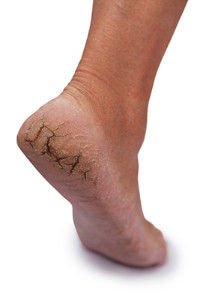 An uncomfortable and often painful foot condition known as cracked heels may occur for a variety of reasons. The most common cause is dry skin, which causes the cracks, also known as fissures, to develop. The skin may become dry for several reasons including standing for extended periods of time, specific skin conditions such as eczema, psoriasis, or athlete’s foot, and being overweight. An additional cause of cracked heels may come from wearing sandals that have an open back and these types of shoes may lack the support that is needed for healthy feet. If you have noticed that you have cracked skin on your heels, it’s suggested to wash the feet thoroughly followed by utilizing a good moisturizer, which may be more effective when used on damp skin. Please schedule a consultation with a podiatrist for a complete diagnosis in addition to discussing the best treatment options for you.
An uncomfortable and often painful foot condition known as cracked heels may occur for a variety of reasons. The most common cause is dry skin, which causes the cracks, also known as fissures, to develop. The skin may become dry for several reasons including standing for extended periods of time, specific skin conditions such as eczema, psoriasis, or athlete’s foot, and being overweight. An additional cause of cracked heels may come from wearing sandals that have an open back and these types of shoes may lack the support that is needed for healthy feet. If you have noticed that you have cracked skin on your heels, it’s suggested to wash the feet thoroughly followed by utilizing a good moisturizer, which may be more effective when used on damp skin. Please schedule a consultation with a podiatrist for a complete diagnosis in addition to discussing the best treatment options for you.
Cracked heels are unsightly and can cause further damage to your shoes and feet. If you have any concerns, contact Dr. Sharon Pletcher from Pennsylvania. Our doctor can provide the care you need to keep you pain-free and on your feet.
Cracked Heels
Cracked heels appear unappealing and can make it harder for you walk around in sandals. Aside from looking unpleasant, cracked heels can also tear stockings, socks, and wear out your shoes. There are several methods to help restore a cracked heel and prevent further damage.
How Do You Get Them?
Dry skin is the number one culprit in creating cracked heels. Many athletes, walkers, joggers, and even swimmers suffer from cracked heels. Age and skin oil production play a role to getting cracked heels as well.
Promote Healing
Over the counter medicines can help, especially for those that need instant relief or who suffer from chronic dry feet.
Wear Socks – Wearing socks with medicated creams helps lock in moisture.
Moisturizers – Applying both day and night will help alleviate dryness which causes cracking.
Pumice Stones – These exfoliate and remove dead skin, which allows for smoother moisturizer application and better absorption into the skin.
Change in Diet
Eating healthy with a well-balanced diet will give the skin a fresh and radiant look. Your body responds to the kinds of food you ingest. Omega-3 fatty acids and zinc supplements can also revitalize skin tissue.
Most importantly, seek professional help if unsure how to proceed in treating cracked heels. A podiatrist will help you with any questions or information needed.
If you have any questions, please feel free to contact our office located in State College, PA. We offer the newest diagnostic and treatment technologies for all your foot care needs.
Read more about Solutions for Cracked Heels



